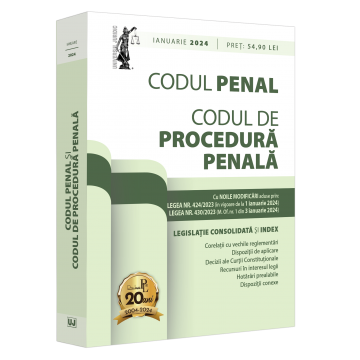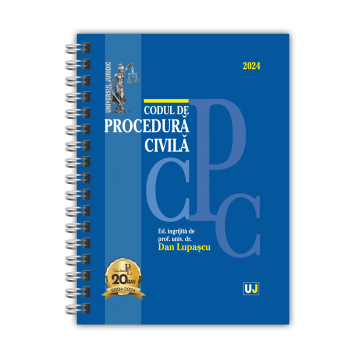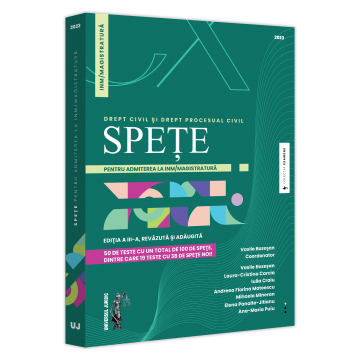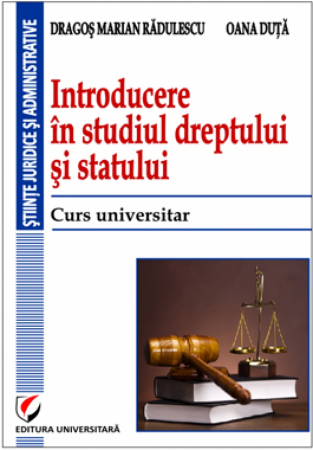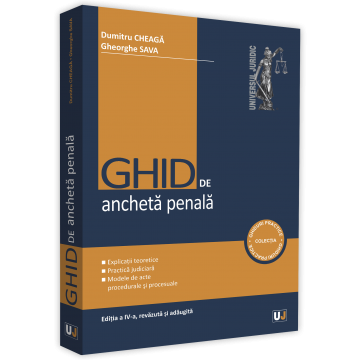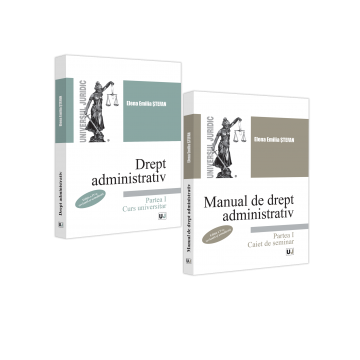ISBN: 978-606-591-191-8
Publisher year: 2011
Edition: I
Pages: 206
Publisher: Editura Universitara
Author: Oana Surdescu
- Description
- Where to find it
- Authors
- Reviews (0)
"The pilot decision in the European Court of Human Rights", author Mrs. Oana Surdescu, treats a topic of great interest, given the major role the Court plays in protecting human rights on the European continent and instead increasing the ECHR ruling procedure and pilot work in relationship with the Council of Europe bodies of the States Parties in 1950 rights and fundamental freedoms.
These are decisions which the Court called repetitive identify those causes in which people invoke the same violations by States Parties to the Convention, the Court identified the existence of malfunctions in legislation, its application in the operation or administration of justice and the rule provides guidelines clear on how you can eliminate these malfunctions and ensure settlement of cases internally.
It is understood that interest on such analysis, which it offers plenty of work for those who, in Romania, track work-related complaints to the ECHR judges, attorneys, and interested persons, as well as academia, teachers, students who are preparing to defend human rights in various fields.
The work is based on a rich practice of ECHR decisions on pilot decisions on many countries on the continent. Although these decisions affect several states in Central and Eastern Europe (Russia, Poland, Slovenia, Moldova, Turkey and of course Romania), which is explained by the deficit of democracy, some of which refer to states with democracies ( Italy, Germany, United Kingdom). Among the causes of repetitive complaints are analyzed: dysfunctions of laws, poor enforcement of laws, internal practices contrary to the laws and provisions of the Convention, non-enforcement of national courts, the excessive length of judicial proceedings.
The author treats in detail the objectives of pilot decisions: to help States Parties to fulfill their role in implementation of the Convention, given the subsidiary role of the ECHR, to improve human rights protection at national level, to ensure the remedy for violations fastest, most rapid and efficient repair of damage caused to persons, to speed up structural or systemic problems that gave rise to repetitive cases. Rightly underlined the positive effects of pilot judgments: avoid cascading convictions of the States concerned, the applicants get faster reinstatement rights, benefits and people who have brought actions in court, but the same situation, the business They open Court.
It presents the procedure of adopting decisions carefully pilot that when presented with a fully illustrated, by choosing one or more causes of repetitive, then the adjudication of these cases on the merits and also highlighting the gap that may occur, considering the number of complaints already the Court and the number of which may be of similar complaints, ending up with solutions providing guidance on State concerned may take to eliminate malfunctions.
Some decisions pilot examination of the complaints that include suspension for a period of time due to leave the State to implement measures for dealing with the general question, at the end of this period, the Court examines the measures taken and their effectiveness, and if they led to solving cases pending or take note of them and strike them.
The author presents a lot of courage and personal opinions on the role and effectiveness of the procedure the pilot, which he presents as an important step in the activity of the Court, in close connection with the reform of human rights protection in the Council of Europe, to make it more efficient and respond to the increasing number of complaints.
The work is of particular interest due to the large number of judgments of the Court, presented in full and some commented. A special place is the presentation decisions for Romania, their evolution (Faimblat 2009, Katz 2009, Viasu 2008), culminating in the decision in question Maria Atanasiu and others in 2010, presented in detail together with applicable law and court decisions of successive Roman as well as a comparative law analysis on how they solved the problem of property confiscated in the past other European countries.
Pilot decision because Maria Atanasiu and Others v. Romania, adopted on 12 October 2010, includes the decision to suspend for a period of 18 months of staying to the final (three months after adoption) examine any complaints arising from the issue of restitution or compensation for property rights for granted Romanian government to take steps to resolve these internal causes.
The author is based on a rich and recent references, including among other valuable papers with the Court-current Romanian judges judge and the first judge Corneliu Barsan Marin Voicu, a great specialist in the analysis of the Court's work, Vincent Berger and other lawyers and Romanian brand foreigners.
It is a work that responds to current concerns clear, which I highly recommend.
Dr. Ion Diaconu
Customer Support Monday - Friday, between 8.00 - 16.00
0745 200 718 0745 200 357 comenzi@editurauniversitara.ro
6359.png)
![The pilot decision of the ECHR jurisprudence [1] The pilot decision of the ECHR jurisprudence [1]](https://gomagcdn.ro/domains/editurauniversitara.ro/files/product/large/hotararea-pilot-in-jurisprudenta-cedo-2022-994732.jpg)
